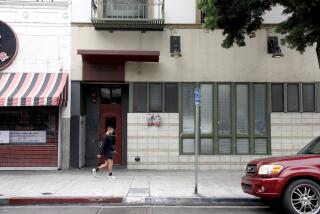Temple City Couple Sues Real Estate Investor for $5 Million
- Share via
TEMPLE CITY — A couple who claim that wealthy real estate investor William Little illegally backed out of a deal to sell them a house have filed a $5-million suit against Little and his realty corporation.
The suit, alleging fraud and breach of contract, was filed in Los Angeles Superior Court on behalf of Brian Atkins and his wife, Karen, who said that 18 months ago Little agreed to sell them a house in Temple City for $131,000 but refused to complete the sale.
Named as defendants are Little, 2974 Properties Inc. of Los Angeles, which Little owns, and Community Escrow Co. of Los Angeles.
Little was the landlord involved this month in two highly publicized cases. He attempted to evict ailing band leader Woody Herman from a home in the Hollywood Hills for failure to pay four months’ rent, and he evicted 73-year-old Jessie Davis from a two-bedroom home in Los Angeles for failure to pay her September rent.
The eviction of Herman was stopped after his friends and fans volunteered to make the rent payments on the house, which Herman once owned but lost through foreclosure. Little said Davis’s eviction was a mistake and he arranged to have her belongings moved back into the house at his expense.
Attorney Trudy Polsky, who represents the Atkinses, said their case is similar to a lawsuit she won against Little five years ago for backing out of a deal to sell a house in La Puente.
In that case, a Norwalk Superior Court jury found that Little improperly reneged on a deal with one buyer to make an extra $2,000 by taking a later offer and ordered Little to pay $240,000 in damages to the first buyer. The court decision was upheld on appeal and, in 1985, Little paid a judgment that amounted, with interest, to more than $290,000.
Little, who owns several hundred properties, testified in 1982 that he had amassed $17 million worth of real estate, much of it bought at foreclosure sales.
Attorney Marc Rohatiner, who represents Little, said his client is willing to settle the suit with the Atkinses by selling them the house at the price originally agreed upon, $131,000.
Brian Atkins said he would welcome the opportunity to complete purchase of the two-bedroom home for $131,000, but a settlement must still be negotiated. “We’re hoping that something can be done,” he said.
Unlike the La Puente case, in which two buyers competed for one house, there has never been another buyer for the Temple City property and Little has never tried to sell it to anyone else, Rohatiner said. He said the sale has been complicated by a tax lien on the property.
The house belonged to the parents of Brian Atkins before Little acquired it.
In the lawsuit, Atkins, 26, says that he has lived in the house since 1982 and was planning to buy it from his parents. Instead of paying rent to his parents, he made monthly payments on a $64,000 first trust deed.
Atkins said he was unaware that the property also had a second trust deed and a tax lien against it. Failure to make payments on the second trust deed led to a foreclosure sale, at which Little acquired the property.
The suit says that the Atkinses agreed to buy the house from Little in March, 1986, for $131,000.
The couple deposited $5,000 in escrow, paid fees for appraisal and credit reports and secured approval of a $104,000 loan to supplement their down payment. The suit says closure of the escrow, originally scheduled for 30 days, was delayed by Little after the Internal Revenue Service demanded that its tax lien be paid from Little’s proceeds.
The suit alleges that Little repeatedly assured the couple that the tax lien problem would be overcome and that they should not seek another house.
Little has allowed the couple to continue to live in the house in exchange for paying $650 a month to the bank that holds the first trust deed.
Rohatiner said a federal tax lien of $51,000 was imposed on the property in 1982. Little and 2974 Properties Inc. of Los Angeles have filed suit against the Internal Revenue Service in federal court challenging the validity of the tax lien and also have filed suit in Los Angeles Superior Court against the previous property owners to seek compensation if the federal tax lien is upheld.
Rohatiner said he is in the process of arranging for a bond for the tax lien that will permit the sale of the house to go forward.
Polsky said the tax lien should never have stalled the sale. In the lawsuit she filed for the Atkinses, Polsky said that “defendant William Little’s net worth (which is many millions) and his expertise in legal proceedings, foreclosures, tax sales, etc., were more than sufficient for him to pay, bond around, indemnify any lien or liens on any of his properties and/or take any action necessary to complete the transaction. He could have easily taken care of this tax lien.”
The suit alleges that the $131,000 sale price was more than enough to pay off the tax lien and any other encumbrances on the property and still net Little “a handsome profit.”
The suit says that in July of this year, Community Escrow Co., acting on instructions from Little and his realty corporation, asked the Atkinses to sign a cancellation agreement terminating the sale and refunding only $3,410 of their $5,000 deposit. The remainder would have been consumed by fees for a termite inspection, title search and escrow cancellation.
Instead of signing the agreement, the Atkinses filed suit.
The suit alleges that real estate prices and interest rates have risen since the sale was initiated 18 months ago, and that the Atkinses cannot purchase a comparable house for the same amount today. In addition, the suit says, the couple installed new windows, ceiling fans, carpeting, landscaping and other improvements in the belief that they would soon own the house.
More to Read
Sign up for Essential California
The most important California stories and recommendations in your inbox every morning.
You may occasionally receive promotional content from the Los Angeles Times.










